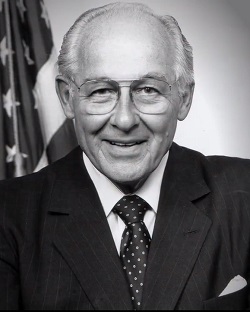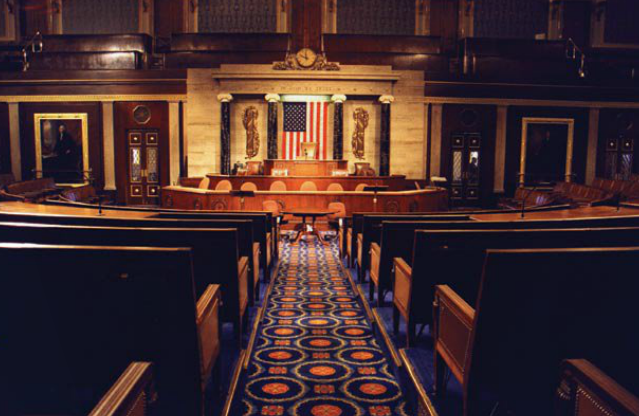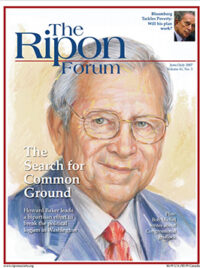
American politics is mostly about the personalities of the people who serve in office or aspire to it. Personalities make good theater. They keep the press in profits. They keep people interested and entertained. The people in politics embody the best and worst of our American system of government.
But our system isn’t just about the people who serve in the institutions of government; it is also about the institutions themselves.
Congress, one of the pillars of our political and governmental system, the seat of power in our democratic republic, is an institution suffering from age and neglect. Our seat of government is losing its legs. In this Presidential election year, public attention will be riveted on the personalities of the candidates, but more attention should be focused on the institutions in which those elected will serve.
Congress, one of the pillars of our political and governmental system, the seat of power in our democratic republic, is an institution suffering from age and neglect.
I spent 40 years in Congress, and not in all of that time did I ever have the sense that the institution itself was incapable of handling the people’s business. I believe that is the case now.
Complex issues such as energy independence, long-term health care, retirement security, individual security, tax reform, and homeland security have been passed over, glossed over and treated cosmetically for so long, they have taken on gargantuan and unmanageable dimensions. They have become chronic problems that defy comprehensive solution. The legislative process can no longer handle the backlog of issues and problems that have building for years — Social Security solvency, to name just one. The institution resists change. It merely shifts the demand for change from one Congress to another.
Congress needs reform. This venerable, great parliamentary institution of modern times is suffering from fatigue and old age. It is moving more slowly into the 21st Century than most other influences on American life, from cultural diversity to technology. And it is not serving that fundamental responsibility envisioned by the Founding Fathers to be a check in a system of checks and balances. Today, there are too many checks and not enough balance.
Congress should establish a Joint Committee on Structural Reform to examine the structural needs in both Houses and report recommendations to modernize the Congress as soon as possible. The first Article of our great Constitution established the Congress while allowing, “each House to establish its own rules of proceeding.” From the very beginning, the two Houses used joint committees to resolve their differences and reform their procedures.
Here are several areas in the structure of the Congress, mostly internal, that need immediate attention:
Committee Jurisdictions: The 911 Commission had it right when it recommended identical Homeland Security Committees in the House and Senate. Why not all the committees? The garbled jurisdictional overlays breed jealousy and protectiveness so movement is stopped or painfully slow. Authorizations don’t get done and conferences break down. Executive Branch officials spend endless hours on the Hill running from committee to committee to testify. Committee staffs end up in tedious disputes, writing memoranda of understanding to assert jurisdiction and control.
The Appropriations Process: The appropriations process is broken. Appropriations are unauthorized or contain authorizations contrary to House rules. Appropriations are often held hostage by ineffective authorization and budget processes. The result is mammoth stop gap continuing resolutions, omnibus bills and bloated supplementals that attempt to solve too many problems in too little time, with too many players in the game. As a former appropriator I am willing to at least discuss what some would call unthinkable – appropriations folded into authorizing committees.
The Congressional Budget Process: The Budget Process is also broken. The scoring of emergency spending, the roles of enhanced rescissions and pay-go budgeting, all need a second look. A two-year budget cycle should be considered, as election year budgets have become mostly political documents. The Budget Process hasn’t been thoughtfully and thoroughly reviewed since its inception in 1974, and it won’t be done correctly unless both Houses sit down together to do it.

A joint committee- comprised of Republicans and Democrats, Members of the House and Members the Senate – would go a long way towards beginning the necessary public dialogue on how our institutions should perform.
Congressional Oversight: Congress can’t seem to get its oversight responsibilities right. It’s either not enough or too much. At times, it’s either political protectionism or political retribution. Oversight is best done in pursuit of a legitimate legislative purpose, not a political point. Congress has a constitutional and institutional obligation to conduct oversight of the government, but for the sole purpose of making the government function better.
The Legislative Schedule: The failure of the committee system has left unproductive gaps in floor activity, and without votes on the floor it is harder to get a quorum to enable the committees to act. Time is wasted. There has to be a proper balance between the needs of the members to be back in their districts as well as in Washington. The two Houses should explore options for meeting times, possibly two full consecutive weeks a month working, with Committees or Subcommittees meeting all five days. Two weeks would be off so that elected representatives could be at home with their constituents in the spirit of the “citizen legislator.”
Procedural Gridlock: In the House, the majority regularly and consistently violates the rights of the minority. In the Senate, the minority regularly and consistently violates the rights of the majority. The result is undemocratic, unfair and unproductive. The abuse of procedures, most notably in the Senate, stymies progress and makes it difficult to get legislation to the President’s desk. In the modern Senate, it takes a two-thirds vote to pass virtually any piece of legislation. The threat of a filibuster on every possible motion has resulted in nameless holds on legislation and hour after hour of an empty chamber conducting phantom quorum calls. For many Americans, the Senate on C-Span has become nothing more than a classical music channel.
These are basic, inside-baseball problems that thwart the process and leave the American people bewildered as to why more doesn’t get done. The truth is the American people have little knowledge of how Congress functions, or why and how it evolved over the past 220 years. And until the people understand their Congress, Congress will be unable to address the critical, complex issues of our time.
A joint committee – comprised of Republicans and Democrats, Members of the House and Members of the Senate – would go a long way towards beginning the necessary public dialogue on how our institutions should perform.
It would also be a good beginning towards undoing the structural gridlock that confounds our Congress – and our Nation.
The Honorable Bob Michel served in the U.S. House of Representatives from 1957 to 1995. He served as Republican Whip from 1975 to 1980, and as Republican Leader from 1981 to 1995.




